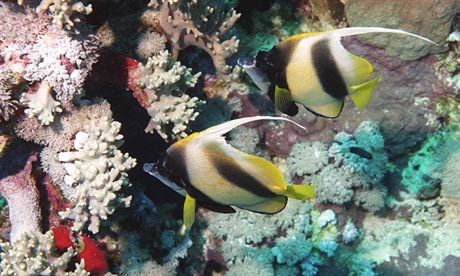Overfishing and pollution are part of the problem, scientists say, warning that mass extinction of species may be inevitable
- The Guardian, Wednesday 2 October 2013

Coral is particularly at risk from acidification and rising sea temperatures.
Photograph: Paul Jarrett/PA
An international audit of the health of the oceans has found that overfishing and pollution are also contributing to the crisis, in a deadly combination of destructive forces that are imperilling marine life, on which billions of people depend for their nutrition and livelihood.
In the starkest warning yet of the threat to ocean health, the International Programme on the State of the Ocean (IPSO) said: "This [acidification] is unprecedented in the Earth's known history. We are entering an unknown territory of marine ecosystem change, and exposing organisms to intolerable evolutionary pressure. The next mass extinction may have already begun." It published its findings in the State of the Oceans report, collated every two years from global monitoring and other research studies.
Alex Rogers, professor of biology at Oxford University, said: "The health of the ocean is spiralling downwards far more rapidly than we had thought. We are seeing greater change, happening faster, and the effects are more imminent than previously anticipated. The situation should be of the gravest concern to everyone since everyone will be affected by changes in the ability of the ocean to support life on Earth."
Coral is particularly at risk. Increased acidity dissolves the calcium carbonate skeletons that form the structure of reefs, and increasing temperatures lead to bleaching where the corals lose symbiotic algae they rely on. The report says that world governments' current pledges to curb carbon emissions would not go far enough or fast enough to save many of the world's reefs. There is a time lag of several decades between the carbon being emitted and the effects on seas, meaning that further acidification and further warming of the oceans are inevitable, even if we drastically reduce emissions very quickly. There is as yet little sign of that, with global greenhouse gas output still rising.
Corals are vital to the health of fisheries, because they act as nurseries to young fish and smaller species that provide food for bigger ones.
Carbon dioxide in the atmosphere is absorbed by the seas – at least a third of the carbon that humans have released has been dissolved in this way, according to the Intergovernmental Panel on Climate Change – and makes them more acidic. But IPSO found the situation was even more dire than that laid out by the world's top climate scientists in their landmark report last week.
Read More Here








No comments:
Post a Comment
Hello and thank you for visiting my blog. Please share your thoughts and leave a comment :)